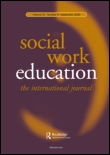
SOCIAL WORK EDUCATION
Scope & Guideline
Transforming Practices through Evidence-Based Insights
Introduction
Aims and Scopes
- Social Justice and Anti-Oppression:
The journal emphasizes the importance of social justice and anti-oppressive frameworks within social work education. It seeks to explore how these principles can be effectively integrated into curricula and pedagogical practices. - Interprofessional Education:
There is a significant focus on interprofessional education, highlighting collaborations between social work and other health and social service professions to enhance the competency and effectiveness of future practitioners. - Innovative Pedagogical Practices:
The journal promotes innovative teaching strategies, including experiential learning, simulation-based education, and the use of technology to enhance student engagement and learning outcomes. - Cultural Competency and Diversity:
A core aim is to prepare social workers to engage with diverse populations through culturally competent practices, addressing issues related to race, gender, sexuality, and disability. - Research and Evidence-Based Practice:
The journal underscores the importance of evidence-based practice in social work education, encouraging the use of research to inform teaching and curriculum development. - Field Education and Practicum Experiences:
It highlights the critical role of field education in preparing students for real-world social work practice, focusing on best practices and innovations in field placements.
Trending and Emerging
- Integration of Technology in Education:
There is a clear trend towards incorporating technology into social work education, with a focus on online learning, virtual simulations, and the use of AI tools to enhance teaching and learning. - Focus on Racial Equity and Anti-Racism:
Recent publications increasingly address racial equity, anti-racism, and the lived experiences of marginalized groups, indicating a strong commitment to social justice within social work curricula. - Environmental Justice and Sustainability:
Emerging themes include the integration of environmental justice into social work education, highlighting the importance of addressing climate change and its impact on vulnerable populations. - Mental Health and Trauma-Informed Care:
There is a growing emphasis on mental health issues and trauma-informed care within social work education, reflecting the increasing recognition of mental health as a critical component of social work practice. - Political Engagement and Advocacy:
Recent articles emphasize the role of social work education in preparing students for political participation and advocacy, underscoring the profession's commitment to social change. - Experiential Learning and Community Engagement:
An increase in papers focusing on experiential learning, service-learning, and community engagement reflects a trend towards practical, hands-on approaches to education.
Declining or Waning
- Traditional Classroom Instruction:
There appears to be a decline in papers centered around traditional, lecture-based classroom instruction, as the emphasis shifts towards more active and experiential learning methodologies. - Generalized Social Work Practices:
Papers discussing generalized social work practices without a specific focus on marginalized populations or social justice issues are becoming less frequent, indicating a move towards more specialized and critical approaches. - Historical Perspectives on Social Work Education:
There is a noticeable decrease in discussions surrounding historical perspectives and traditional curricula, as contemporary issues and modern pedagogical methods take precedence. - Single-Discipline Focus:
The focus on single-discipline social work education is waning, with a growing emphasis on interdisciplinary approaches that incorporate insights and practices from various fields.
Similar Journals
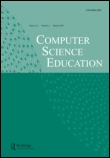
Computer Science Education
Advancing the Frontier of Computer Science LearningComputer Science Education is a prestigious journal published by ROUTLEDGE JOURNALS, TAYLOR & FRANCIS LTD, focusing on the critical intersection of computer science and educational practices. Established in 1988, this journal has become a cornerstone for researchers, educators, and practitioners interested in enhancing teaching methodologies and learning outcomes in computer science. With an impressive ranking within the top quartile (Q1) in both Computer Science (miscellaneous) and Education categories for 2023, as well as high Scopus percentile placements, it underscores its significance in advancing the discipline. The journal offers a platform for innovative research encompassing diverse educational environments and approaches, and while it currently does not offer open access options, it remains committed to disseminating high-quality scholarly work. As a vital resource for anyone looking to contribute to and understand the evolving landscape of computer science education, Computer Science Education continues to shape the future of learning in this dynamic field.
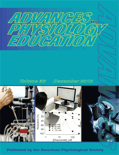
ADVANCES IN PHYSIOLOGY EDUCATION
Cultivating Knowledge Through Innovative TeachingADVANCES IN PHYSIOLOGY EDUCATION, published by the American Physiological Society, is a leading journal dedicated to the field of physiology education, with a commitment to advancing teaching practices and pedagogical strategies in this vital discipline. Established in 1998, the journal has consistently provided a platform for original research and discussion, fostering the improvement of educational methodologies. With an impressive impact factor and ranked in Q2 for Education and Q3 for Physiology, it reflects a robust academic influence within the research community. The journal ranks #458 out of 1543 in Social Sciences - Education and #130 out of 193 in Biochemistry, Genetics, and Molecular Biology - Physiology according to Scopus, highlighting its critical role in shaping physiology education. While it operates on a subscription model, its focus remains on promoting innovative education practices that benefit both educators and students alike. This journal is essential reading for anyone looking to enhance their understanding of physiology teaching and learning.
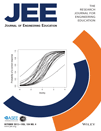
JOURNAL OF ENGINEERING EDUCATION
Empowering Educators to Transform Engineering EducationJOURNAL OF ENGINEERING EDUCATION, published by the American Society for Engineering Education, stands as a premier academic resource dedicated to the field of engineering education. With an impressive Q1 ranking in both Education and Engineering categories as of 2023, this journal emphasizes high-impact research that shapes pedagogical practices and advances engineering educational methodologies. Since its inception in 1969, it has fostered intellectual exchange and innovation within the community, earning a notable recognition as indicated by its Scopus rankings—#27 in Social Sciences Education and #14 in General Engineering. Although it does not provide open access, the journal welcomes submissions exploring diverse topics in engineering education, creating a platform for researchers and practitioners to examine trends, best practices, and outcomes in this vital area. By promoting scholarship that invigorates educational practices, the JOURNAL OF ENGINEERING EDUCATION is pivotal in influencing the future of engineering training and competency development.
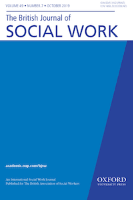
BRITISH JOURNAL OF SOCIAL WORK
Fostering Dialogue in Social Work ScholarshipThe British Journal of Social Work, published by Oxford University Press, is a premier academic journal dedicated to the field of social work and its interdisciplinary connections. With an impressive history dating back to 1971, this journal has established itself as a leading forum for innovative research and critical discourse in social sciences, where it holds a distinguished ranking in the Q1 category for Social Sciences (miscellaneous) and Q2 for Health (social science) and Social Work as of 2023. Readers can expect to engage with high-impact articles that span a variety of topics including but not limited to social policy, mental health, and community practice. Although it currently does not offer open access, the British Journal of Social Work remains a key resource for professionals, researchers, and students aiming to deepen their understanding and contribute to the evolving landscape of social work practice and theory. The journal continues to foster a vibrant academic community, supporting ongoing dialogue and collaboration in the pursuit of social justice and effective welfare practices.
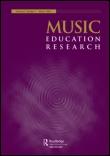
Music Education Research
Exploring Innovative Pedagogies in MusicMusic Education Research is a prestigious journal dedicated to advancing scholarship in the field of music education, published by Routledge Journals, Taylor & Francis Ltd. With a significant impact factor reflected in its Q1 ranking in Music and Q2 in Education for 2023, this journal is a critical resource for researchers, educators, and practitioners alike. It consistently ranks high in both the Arts and Humanities and Social Sciences categories, with an impressive position of Rank #8 in Music out of 180 journals, indicating its influence in shaping contemporary discourse. Aimed at fostering innovation and critical examination within music education, Music Education Research invites submissions that explore a broad spectrum of topics, encompassing pedagogical practices, policy implications, and curriculum development. Operating from the United Kingdom, the journal provides a vital platform for sharing cutting-edge research and is committed to improving music learning experiences across various educational contexts.

Revista Peruana de Investigacion Educativa
Illuminating Pathways for Educational AdvancementRevista Peruana de Investigacion Educativa is a distinguished academic journal published by the SOC INVESTIGACION EDUCATIVA PERUANA, dedicated to advancing knowledge within the field of educational research. With its ISSN 2076-6300 and E-ISSN 2077-4168, this peer-reviewed journal aims to provide a platform for scholars, educators, and practitioners to disseminate innovative research findings, theoretical advancements, and critical reviews related to educational practices in Peru and beyond. Although the journal currently operates without an open-access model, its commitment to quality and relevance is reflected in its rigorous editorial standards. By fostering dialogue on pivotal educational issues, Revista Peruana de Investigacion Educativa plays an important role in enhancing educational outcomes and shaping policy decisions, making it an essential resource for researchers, professionals, and students interested in the dynamics of education in the Latin American context.
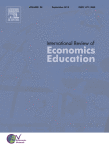
International Review of Economics Education
Innovating Pedagogy: Shaping the Future of Economics LearningThe International Review of Economics Education, published by Elsevier Science Ltd, serves as a vital platform for disseminating high-quality research in the field of economics education. With an ISSN of 1477-3880 and an E-ISSN of 2352-4421, this esteemed journal features a range of scholarly articles that evaluate and enhance teaching methodologies, curriculum development, and educational practices in economics. Operating out of the United Kingdom, and recognized within the Q2 category in Education for 2023, it stands out in the competitive landscape of social sciences with a Scopus rank of #333 out of 1543, positioning it in the 78th percentile among its peers. Researchers, educators, and students will find the journal's focus on innovative economics teaching approaches particularly relevant for advancing pedagogical techniques and improving student engagements. While the journal does not currently offer Open Access options, its contributions are essential for anyone dedicated to the scholarly advancements in economics education from 2003 to the present and beyond.

Asia-Pacific Science Education
Bridging Knowledge Gaps in the Asia-Pacific RegionAsia-Pacific Science Education is a leading academic journal dedicated to advancing the field of science education across the Asia-Pacific region. Published by BRILL, this Open Access journal has been available to the global research community since 2015, ensuring that vital scientific educational discoveries and methodologies reach a broad audience without barriers. With an impressive Scopus rank of #869 in the Social Sciences Education category and classified in the Q2 quartile for 2023, the journal showcases high-quality research that pushes the boundaries of teaching and learning in science disciplines. Scholars, educators, and policymakers alike can benefit from its rigorous analyses and innovative practices aimed at enhancing science education practices and policy in diverse contexts, making it an invaluable resource for driving academic excellence and informed decision-making in education.

Australian Social Work
Exploring contemporary issues in Australian social work.Australian Social Work, published by Routledge Journals, Taylor & Francis Ltd, stands as a leading academic journal dedicated to advancing the field of social work through rigorous research and scholarly discourse. Since its inception in 1971, the journal has provided a vital platform for researchers, practitioners, and students to engage with contemporary issues and developments within social work and its related disciplines. With an impressive 2023 impact factor reflected in its Q1 and Q2 rankings across prominent categories such as Social Sciences and Health (social science), it is recognized for its quality and relevance in the field. The journal does not offer open access, ensuring that its articles maintain a high standard of peer review while catering to a targeted readership. By exploring critical topics and fostering interdisciplinary dialogue, Australian Social Work contributes significantly to the evolution of social work practice and policy, positioning itself as an indispensable resource for those committed to academic excellence and social betterment.
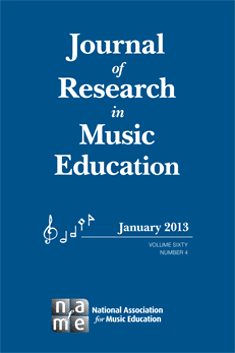
JOURNAL OF RESEARCH IN MUSIC EDUCATION
Exploring Innovative Pathways in Music TeachingThe JOURNAL OF RESEARCH IN MUSIC EDUCATION, published by SAGE PUBLICATIONS INC, is a leading academic outlet in the field of music education, dedicated to advancing the study and understanding of music teaching and learning. With an impressive impact factor and classified in the Q1 category for both Education and Music, this journal plays a critical role in disseminating innovative research and insights that foster effective educational practices. Since its inception in 1953, it has maintained a rigorous peer-review process, contributing to its strong reputation within the academic community, as evidenced by its high rankings in Scopus. The journal's focus spans a wide range of topics, including pedagogical strategies, curriculum development, and the intersection of music and education policy, making it an essential resource for researchers, educators, and students alike. As it continues to evolve, users can explore a treasure trove of knowledge that supports the transformative power of music education in the 21st century.